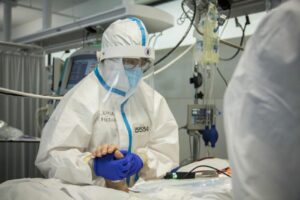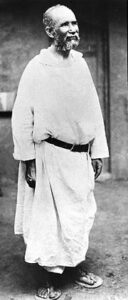I’m alive, and the monotonous sound of the respirator, of the machines that control me, lets me know that my heart has not stopped. I don’t know when or how I got here. My watch stopped in my mind, and I stopped seeing time pass in that object that situates me in the moment and that, for now, I do not miss. The sounds of my house, my work, my street, the bar where I have  coffee or beer, have remained on a hard disk that I do not know if I will retrieve. The virus knocked everything out of control, and separated me from those I love. What used come to me through the media remotely about how people were in the same situation that I am now, is my reality at this moment. Like so many things in life, you think that it will never happen to you.
coffee or beer, have remained on a hard disk that I do not know if I will retrieve. The virus knocked everything out of control, and separated me from those I love. What used come to me through the media remotely about how people were in the same situation that I am now, is my reality at this moment. Like so many things in life, you think that it will never happen to you.
I realize that there are people who are taking care of me; I can’t see them clearly, and it’s like being in a spaceship, where you only see their eyes through their safety goggles and the screens that protect them from me, just like what I use at work. I am a danger, but a danger that requires their attention and, I believe, much tender care, even if they didn’t know me before. I don’t know their names, nor does their voice reach me clearly – although always without demands – and I don’t understand what they’re saying to me. I let myself be attended to. I can’t move and nor do I even wish to move a finger.
 I do not know if it is day or night. They put me face up and face down every so often, a time that I can’t calculate. I am very relaxed; I don’t feel the contact of my body with anything. When I open my eyes, I know that there is someone close by, looking after me. I would like to say, “thank you”. This is how being sedated must be. I have never felt like this, and it is even pleasant, because I do not feel pain, or sadness, or any self-concern.
I do not know if it is day or night. They put me face up and face down every so often, a time that I can’t calculate. I am very relaxed; I don’t feel the contact of my body with anything. When I open my eyes, I know that there is someone close by, looking after me. I would like to say, “thank you”. This is how being sedated must be. I have never felt like this, and it is even pleasant, because I do not feel pain, or sadness, or any self-concern.
I breathe and thank that machine that allows the cells of my body to be oxygenated, and my brain to remain active, though in slow motion. The truth is that it is good here.
There is something that accompanies me in the moments when I can think and feel: the people outside and how worried they must be for me. I have my wife, who has given me three wonderful children, although the youngest, fourteen, is at an awkward age and is unbearable. For sure he is missing me, and more so now, that he has a foot in a cast and I am the one who takes him to the institute. Every year, a cast  playing soccer, falling off the bike or jumping like a kangaroo. This child breaks all over the place. My eldest son, in first year of university, for whom I have sweated blood so that he studies, encouraging him when he wanted to throw in the towel and look for a job. And in this we have both sweated blood. But my memory is already failing me. And then there is my daughter, the middle one, my right eye, the one that pampers me when she sees me worried, the one who still sits next to me and rests her head on my chest, without saying anything to me, since she is my daughter. When I argue with my wife, who tolerates my mood swings and is the first to make peace, I realize how lucky I am, because it is in tough times that people show their worth, and then she makes me feel the human value of who we are, what we both are, not just me. And we smile once more…
playing soccer, falling off the bike or jumping like a kangaroo. This child breaks all over the place. My eldest son, in first year of university, for whom I have sweated blood so that he studies, encouraging him when he wanted to throw in the towel and look for a job. And in this we have both sweated blood. But my memory is already failing me. And then there is my daughter, the middle one, my right eye, the one that pampers me when she sees me worried, the one who still sits next to me and rests her head on my chest, without saying anything to me, since she is my daughter. When I argue with my wife, who tolerates my mood swings and is the first to make peace, I realize how lucky I am, because it is in tough times that people show their worth, and then she makes me feel the human value of who we are, what we both are, not just me. And we smile once more…
My friends, my work companions in the car shop, my mother who, although senior, has her head very well screwed on and, as I jokingly tell her, is going to bury us all. The priest of my parish, close and almost a friend, concerned about others and, yes, very much a priest, which is where we clash. He always comes for me to check his vehicle, as he helps me check myself. We are both missing a nut. How many things would I say to them, and now I can’t think of anything. I just know that they are there.
 Just as the people I love come to mind, something also comes to me, that helped me at the time to appreciate others more and to value God’s love, because I am a believer – that’s clear to me now – and although my faith is not very strong, it filled me with the desire to trust in God, to trust him even though I have so much mistrust even in myself. It is the Prayer of Abandonment of Charles de Foucauld, which came to me on a card with his photo which my priest gave me, like a venerable grandfather, although he was not old. When I read the prayer, I didn’t even believe what it said. I don’t know it by heart, but I try to say it every day, and often my wife and I pray those feelings that were born of a man who was a follower of Jesus, who should not have been very famous or a great saint, because few people know him, but I am sure he was a true man of God, crazy and a dreamer, because Jesus infects us with his follies, breaks set patterns and speaks about the Kingdom. That prayer did me a lot of good and there is an echo of it all in what I am living now.
Just as the people I love come to mind, something also comes to me, that helped me at the time to appreciate others more and to value God’s love, because I am a believer – that’s clear to me now – and although my faith is not very strong, it filled me with the desire to trust in God, to trust him even though I have so much mistrust even in myself. It is the Prayer of Abandonment of Charles de Foucauld, which came to me on a card with his photo which my priest gave me, like a venerable grandfather, although he was not old. When I read the prayer, I didn’t even believe what it said. I don’t know it by heart, but I try to say it every day, and often my wife and I pray those feelings that were born of a man who was a follower of Jesus, who should not have been very famous or a great saint, because few people know him, but I am sure he was a true man of God, crazy and a dreamer, because Jesus infects us with his follies, breaks set patterns and speaks about the Kingdom. That prayer did me a lot of good and there is an echo of it all in what I am living now.
 And here, in intensive care, I discover that the heartbeat of my faith has not stopped, that silence, faced with everyday noises, is a joy that lets God speak to you, and that the virus has not separated me from him …
And here, in intensive care, I discover that the heartbeat of my faith has not stopped, that silence, faced with everyday noises, is a joy that lets God speak to you, and that the virus has not separated me from him …
I discover and feel God’s eyes, which look at me with great love, which do not so much observe me, as cover me with his gaze. I would like to tell the assistants, the nurses, the doctor, who comes to observe me several times, that they are the eyes that I need, and that God looks at them also with tenderness, and that his diagnosis is that they have a heart of gold.
And I don’t need to hear the voice of God. I prefer his silence, knowing that I am speechless before him. Why say anything? He knows everything and I thank him for my having got to know him, and because he has never stopped caring about me. I let myself be formed by him, although so many times in my life I have resisted, I have made excuses, I have justified myself by doing only my will.
 I notice God close by, he is looking out for me, and for those who are the same or worse than me in this hospital. I do not feel that he touches me, but I do feel that he seeks my presence. Often, I want to put myself in the presence of God, and it is he who makes himself present, without my calling him, without my waiting a turn to be attended. How had I not noticed him before? Did it need me to be almost in a coma for that? God never ceases to amaze me, even as I am, and I am glad that I have not lost the capacity to be surprised. It’s a sign that I’m not so bad. Almost like the ‘how good it is to be here,’ of Peter on the mountain, in no hurry to go down, savouring the present moment as if it were the only one.
I notice God close by, he is looking out for me, and for those who are the same or worse than me in this hospital. I do not feel that he touches me, but I do feel that he seeks my presence. Often, I want to put myself in the presence of God, and it is he who makes himself present, without my calling him, without my waiting a turn to be attended. How had I not noticed him before? Did it need me to be almost in a coma for that? God never ceases to amaze me, even as I am, and I am glad that I have not lost the capacity to be surprised. It’s a sign that I’m not so bad. Almost like the ‘how good it is to be here,’ of Peter on the mountain, in no hurry to go down, savouring the present moment as if it were the only one.
 Thinking of my children, I think and sense that I am the son of a Father who misses me when I separate from him, who gives his all for me and for humanity, who tolerates all the negative things I have without blaming me for all he does for me, that he helps me bear the casts on my arms or legs and removes the cast from my heart, until I break it again.
Thinking of my children, I think and sense that I am the son of a Father who misses me when I separate from him, who gives his all for me and for humanity, who tolerates all the negative things I have without blaming me for all he does for me, that he helps me bear the casts on my arms or legs and removes the cast from my heart, until I break it again.
 Thinking of my wife, of her qualities, because we are still in love like the first day, I see God doing his valuable work for others, and I discover that she is the instrument of my peace, of our being able between both of us to educate our children, of our understanding each other at a glance, our forgiving our mistakes. It is something that cannot be valued by words, results, or the morals of stupid stories. When we argue, after a while we look into each other’s eyes, without blinking, and we begin to laugh. It is what I now believe that God does with me when He forgives me.
Thinking of my wife, of her qualities, because we are still in love like the first day, I see God doing his valuable work for others, and I discover that she is the instrument of my peace, of our being able between both of us to educate our children, of our understanding each other at a glance, our forgiving our mistakes. It is something that cannot be valued by words, results, or the morals of stupid stories. When we argue, after a while we look into each other’s eyes, without blinking, and we begin to laugh. It is what I now believe that God does with me when He forgives me.
I believe that God’s laughter is contagious for whoever knows how to be grateful, even if they don’t understand anything, or why this or that has happened. It is enough to feel that he has a hand in it.
 I don’t know if what is going through my head is prayer or just personal reflection, if I am following the scheme to pray as God intended or if I am one improvising. I believe that it is the heart that speaks, and that it will have an answer from him. In this way I trust, because as a Father he has never stopped having intensive care for me and for all humanity.
I don’t know if what is going through my head is prayer or just personal reflection, if I am following the scheme to pray as God intended or if I am one improvising. I believe that it is the heart that speaks, and that it will have an answer from him. In this way I trust, because as a Father he has never stopped having intensive care for me and for all humanity.
Aurelio SANZ BAEZA
(Boletín Iesus Caritas 211. English translation review: Liam O’CUIV)
PDF: Intensive care. Aurelio SANZ BAEZA eng



Que relato más verdadero . Aurelio así es la vida y mucho mejor si confiamos en Dios.
Gracias
Me ha llegado como un soplo de viento fresco este relato de Aurelio. En un mundo que ha perdido el sentido de lo esencial y anda tonteando con todo lo accesorio, este relato me vuelve a recordar que las cosas importantes siguen ahí y que son las que hay que cuidar.
Gracias, Aurelio, por haberme hecho llegar a través de tu relato esos sentimientos sinceros que son los que llegan al corazón.